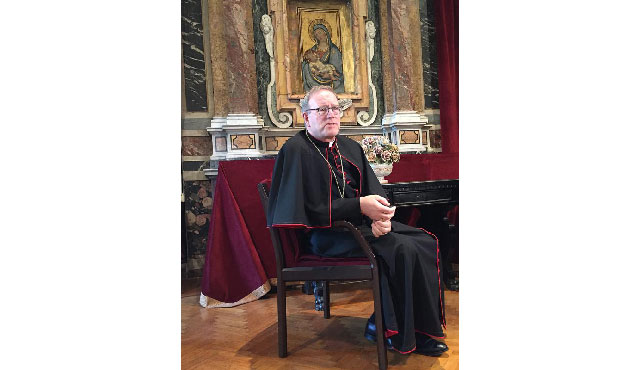ROME (CNS) — In times of crisis, the Catholic Church and its faithful must return to the basics of the Christian faith, said Auxiliary Bishop Robert E. Barron of Los Angeles.
Bishop Barron, who was ordained to the priesthood in 1986, told reporters in Rome March 7 that he has lived most of his priesthood in the context of the church’s sexual abuse crisis and is convinced that the only way forward is to focus on what it really means to be Christian.
The Franciscans, Dominicans and other religious orders were formed at “times of real crisis,” he said. “That’s when great figures like St. Dominic said, ‘Back to the basics, which for him meant poverty, trust in God’s providence, preaching the Gospel.”
The bishop had just received an honorary doctorate in theology from the Dominican-run Pontifical University of St. Thomas Aquinas, commonly called the Angelicum.
Bishop Barron’s “Word on Fire” multimedia ministry, his famous video series on the church and his other outreach work, he said, responded to a desire “to tell the story of Catholicism again; let’s tell the story of the great saints again.”
Dominican Father Michal Paluch, rector of the Angelicum, told reporters the university knew it was giving Bishop Barron an honorary degree at “a very difficult time for the church,” particularly given the abuse scandal.
While norms and procedures are essential for keeping children safe, he said, the church is still about preaching the Gospel “with conviction and energy and enthusiasm, and Bishop Barron is someone who is showing us how to do it.”
Father Paluch said Bishop Barron meets the Dominican’s criteria of “PBS: a preacher, backbone and special.”
The Dominicans, formally the Order of Preachers, want to recognize individuals who excel at preaching, he said, but they must have the “backbone” of solid knowledge of Catholic philosophy and theology — especially the teaching of St. Thomas Aquinas and “St. John Paul II, our most illustrious alumnus.”
But to receive an honorary doctorate, he said, there must a “special” something extra, which in Bishop Barron’s case is his broad outreach.
Immediately after receiving his honorary degree, Bishop Barron delivered a lecture on “divine generosity,” pitting the work of St. Thomas Aquinas against post-modernist writers like Jacques Derrida, who doubted there ever could be a truly “gratuitous gift,” because whenever one receives a gift there is an expectation that something, even just a thank you, be given in return.
“Most philosophies, most ethical systems would fully acknowledge how limited our range of generosity can be,” Bishop Barron said. But in Christianity, Jesus tells his disciples to love their enemies and to forgive people 70 times seven times.
“You have the Lord who gives this extraordinary — to the natural mind, seemingly utopian set of commands — but in fact they are possible in the order of grace,” the bishop told reporters after his talk.
The pagans in the New Testament commenting, “How these Christians love one another,” shows how attractive it is when Christians allow the Holy Spirit to inspire them to love as God loves, which is without expecting something in return, he said.
“It is eminently practical and, I would say, evangelical,” the bishop said. “When people see it, they say, ‘What is that? Where’d that come from?’ And that’s when you see it’s the Holy Spirit.”

